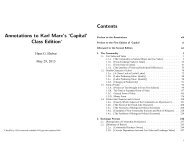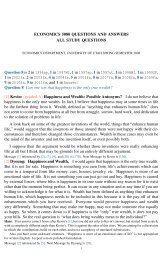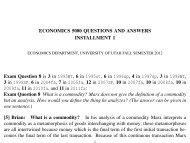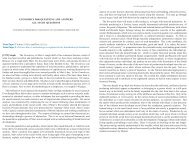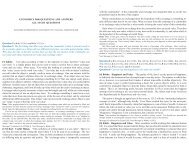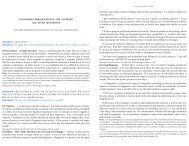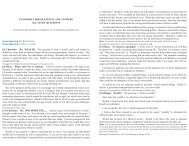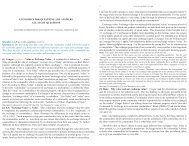Question 1 What did Marx mean with his formu - University of Utah
Question 1 What did Marx mean with his formu - University of Utah
Question 1 What did Marx mean with his formu - University of Utah
You also want an ePaper? Increase the reach of your titles
YUMPU automatically turns print PDFs into web optimized ePapers that Google loves.
U <strong>of</strong> <strong>Utah</strong> Econ 5080 2005fa 11<br />
while the worker whose labor is embodied in the commodity is given little for the work.<br />
When examining the separation between classes it is important to look at the commodity<br />
and especially the production <strong>of</strong> the commodity to see where t<strong>his</strong> conflict starts.<br />
Next Message by Zone is [469].<br />
[231] Thelonius: Capital is defined as; accumulated wealth esp. as used to produce<br />
more wealth. According to t<strong>his</strong> short definition, Capitalism may simply be regarded as<br />
having money in order to make money. The Capitalist class is the strata <strong>of</strong> citizens who<br />
have themselves acculmulated, or have recieved accumulated Capital, for the purpose <strong>of</strong><br />
generating pr<strong>of</strong>it. It is not having money alone that makes a capitalist wealthy, it is the<br />
conversion <strong>of</strong> that money into a marketable commodity form, which can be used for gainful<br />
exchange. Thus, money is converted into real estate, a percentage <strong>of</strong> shares <strong>of</strong> a corporation,<br />
business ventures and so forth. According to <strong>Marx</strong>, Capitalism is pr<strong>of</strong>itable only by some<br />
degree <strong>of</strong> exploitation.<br />
All <strong>of</strong> these conversions are fundamentally based upon the exploitation <strong>of</strong> a natural resource<br />
at some level, but in order for the commodity form to generate pr<strong>of</strong>it in a market<br />
setting, the Capitalist requires a labor force in order to facilitate the production and the exchange<br />
<strong>of</strong> commodities. T<strong>his</strong> labor force is known as the working class, or those who are<br />
paid wages by an employer. The Capitalist class is the commodity holder who pays wages<br />
only to facilitate the exchange <strong>of</strong> commodities for pr<strong>of</strong>it.<br />
Hans: You are forgetting one important ingredient <strong>of</strong> <strong>Marx</strong>’s theory: the value <strong>of</strong> the commodities only comes<br />
from labor.<br />
Next Message by Thelonius is [236].<br />
<strong>Question</strong> 20 is 13 in 1995WI, 120 in 1996sp, 14 in 1997ut, 18 in 2003fa, 24 in 2008fa,<br />
and 23 in 2012fa:<br />
<strong>Question</strong> 20 Would it have been possible to start the book Capital <strong>with</strong> a more commonsense<br />
definition <strong>of</strong> capitalism, such as, capitalist production is production for pr<strong>of</strong>it?<br />
[148] Avatar: graded A It would be ineffective for <strong>Marx</strong> to begin Capital <strong>with</strong> the definition<br />
<strong>of</strong> capitalism, “production for pr<strong>of</strong>it” for two reasons: one is for the sake <strong>of</strong> the logical<br />
development <strong>of</strong> <strong>Marx</strong>’s argument about capitalism, and the other is because <strong>of</strong> the problem<br />
<strong>with</strong> that particular definition <strong>of</strong> the term “capitalism.”<br />
Concerning the continuity <strong>of</strong> the logical progression, that <strong>Marx</strong> is pursuing in <strong>his</strong> case<br />
for understanding capitalism, <strong>Marx</strong> begins <strong>his</strong> assessment <strong>of</strong> capitalism by analyzing the<br />
commodity. Starting <strong>with</strong> the commodity <strong>Marx</strong> is creating the logical framework from which<br />
he argues the element that differentiates capitalism from other economic systems. From<br />
<strong>his</strong> analysis <strong>of</strong> the commodity we get an understanding <strong>of</strong> value and where it comes from<br />
(labor) which ultimately leads to the pr<strong>of</strong>it disparity between the laborer and the capitalist.<br />
The proletariat puts labor into the production <strong>of</strong> a commodity that is rendered valuable by<br />
t<strong>his</strong> process, and is in turn paid a subsistence wage. That arrangement allows the capitalist<br />
to yolk the surplus labor <strong>of</strong> the proletariat. T<strong>his</strong> surplus labor translates to pr<strong>of</strong>it for the<br />
capitalists <strong>with</strong>out the burden <strong>of</strong> the commodity’s actual production labor. T<strong>his</strong> problem in<br />
distribution <strong>of</strong> pr<strong>of</strong>it is what separates the capitalist mode and is therefore what makes the<br />
definition “production for pr<strong>of</strong>it” flawed. Simply to say “production for pr<strong>of</strong>it” is not enough<br />
to define capitalist society because it ignores the way that the “pr<strong>of</strong>it” part <strong>of</strong> t<strong>his</strong> definition<br />
12 2005fa Econ 5080 U <strong>of</strong> <strong>Utah</strong><br />
fits into the capitalist social structure. The relationship between the direct producer <strong>of</strong> a<br />
commodity and <strong>his</strong>/her immediate superior must be addressed <strong>with</strong> the notion <strong>of</strong> production<br />
for pr<strong>of</strong>it to get to the heart <strong>of</strong> capitalism.<br />
As stated above, only an understanding <strong>of</strong> the commodity and thereby an understanding<br />
<strong>of</strong> value <strong>with</strong>in commodities allows a reader to fully understand the relationship between<br />
capitalist and proletariat in regard to labor, value and pr<strong>of</strong>it. That is why <strong>Marx</strong> was right to<br />
begin <strong>his</strong> book <strong>with</strong> a discussion <strong>of</strong> commodity, not a straightforward definition <strong>of</strong> capitalism.<br />
Hans: You have a good style, but you are not addressing things directly enough. For someone who does not already<br />
know what you <strong>mean</strong> it may be difficult to follow you.<br />
Here is my own attempt to say things more “directly”: “production for pr<strong>of</strong>it” is an insufficient characterization<br />
<strong>of</strong> capitalism because it is silent about the source <strong>of</strong> the pr<strong>of</strong>its. In <strong>Marx</strong>’s theory, pr<strong>of</strong>its are the unpaid labor <strong>of</strong> the<br />
wage workers.<br />
Message [148] referenced by [2012fa:602]. Next Message by Avatar is [664].<br />
<strong>Question</strong> 22 is 15 in 1995WI, 20 in 1995ut, 18 in 2001fa, 21 in 2004fa, 26 in 2008fa, 28<br />
in 2011fa, and 25 in 2012fa:<br />
<strong>Question</strong> 22 If <strong>Marx</strong> wanted to start <strong>his</strong> book <strong>with</strong> first principles, why <strong>did</strong> he pick the<br />
analysis <strong>of</strong> the commodity and not the analysis <strong>of</strong> the production process or the analysis <strong>of</strong><br />
value?<br />
[45] Bob: <strong>Marx</strong> answers t<strong>his</strong> question best by stating the wealth <strong>of</strong> a capitalist society is<br />
the commodities <strong>with</strong>in it. The realization that commodities equal wealth is enough reason<br />
to let <strong>Marx</strong> start at t<strong>his</strong> point. T<strong>his</strong> is justification enough for me to understand why he chose<br />
commodities as <strong>his</strong> starting point.<br />
<strong>Marx</strong> could have easily used the production as a starting point, however the is some<br />
problem <strong>with</strong> using production because the factors that go into production are very intense.<br />
You have the area <strong>of</strong> the world in which the production occurs. T<strong>his</strong> can change the price<br />
<strong>of</strong> the production <strong>with</strong> the cost <strong>of</strong> land, labor and capital. Of course these factors tie into a<br />
commodity, but the value <strong>of</strong> the commodity is usually limited to the supply and demand for<br />
a certain area.<br />
I also feel that by starting at commodities <strong>Marx</strong> in a way begins <strong>with</strong> use-value because<br />
it is the possible uses <strong>of</strong> the commodity. It would be hard to start <strong>with</strong> possible uses <strong>of</strong> a<br />
commodity <strong>with</strong>out first introducing what a commodity is and why we need to understand<br />
them. The use-value adds to the wealth <strong>of</strong> a capitalist society. The more uses make it<br />
more marketable. The best example I can think <strong>of</strong> would be the comparison <strong>of</strong> an English<br />
Pr<strong>of</strong>essor and a Business Pr<strong>of</strong>essor. Of course they are both <strong>of</strong> value, but the use value for<br />
the Business Pr<strong>of</strong>essor is much greater because they would have more options in the work<br />
force. T<strong>his</strong> drives the dollar or salary value for them up.<br />
In reality economics follows a path that ultimately goes in a circle. Eventually starting<br />
<strong>with</strong> the explanation <strong>of</strong> a commodity will at one point result in referring to the production <strong>of</strong><br />
the commodity and the use value pertaining to the commodity.<br />
Hans: Michael gave you the right response in [55]. The content <strong>of</strong> material wealth is use-values. T<strong>his</strong> is true in<br />
every society. The form which t<strong>his</strong> wealth takes in capitalism is commodities, i.e., things that can be purchased and<br />
sold.



